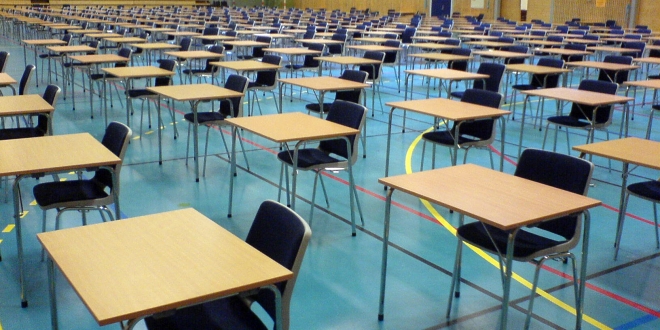The National Education Union has accused the UK government of having it’s “head in the sand” regarding plans for next year’s GCSE and A-level exams, as headteachers complain that the amendments announced this week do not do enough to address the disruption caused by COVID-19.
The exams regulator Ofqual published the outcome of its consultation on how GCSEs and A-levels will be assessed in 2021, saying it will largely remain “business as usual” with exam content mainly unchanged – despite widespread objections by teaching unions.
In one change to the format, GCSE students taking English literature exams next year will not have to cover all of the topics in the curriculum and will be offered a choice of subjects to take an exam on. Ofqual also announced that pupils sitting GCSE exams in history and ancient history next summer will be offered a wider choice of subjects form examination.
Despite the concessions made by Ofqual, school leaders and teaching unions were united in their response that the amendments did not go far enough to take into account the disruption caused by the coronavirus pandemic. Ofqual is yet to decide whether to delay exams in summer 2021 to provide more time for teaching. The period of consultation before their report had proposed delaying the start of the GCSE exams to 7 June next year, but the watchdog said it was still working with the exam boards and the government to consider the best approach.
Ofqual said: “While there was general support for a delay to the exams to allow more time for teaching, respondents were less positive about this if it meant a potential delay to results”.
Commenting on the outcome of Ofqual’s consultation into arrangements for next years exams and assessment, Amanda Brown, deputy general secretary at the National Education Union, said: “We’re concerned that the Government has its head in the sand with its approach to GCSEs and A-Levels in England for 2021. The Government is going to need to adjust the content in GCSEs and A-Levels beyond what was announced today. If the content isn’t set at a realistic level, the results will become more a measure of which groups of students lost the most access to learning under Covid’.
“The Secretary of State has acknowledged that not all students will have covered all elements of their course, or to the depth usually expected by the time they take their exams next summer.
“We need to Covid proof examinations for next year, in order to allow consolidation, proper engagement within each subject and effective learning. Yet today’s confirmation of business as normal for the content of most subjects next year makes insufficient allowance for the disruption this year and allows no contingency for any further disruption as a result of local or regional lockdowns.
“The DfE and Ofqual have acknowledged that students have not had equal opportunities to access learning at home but the adaptations published so far aren’t enough to counter that unfairness. Teachers will ask why it is possible to reduce content in many courses to more realistic levels in Wales but not in England.”
Duncan Baldwin, the deputy director of policy at the Association of School and College Leaders, echoed the sentiments of the NEU, saying: “We remain concerned that these plans for exams in 2021 amount only to tinkering at the edges when it is clear that students could experience widespread ongoing disruption over the course of the next academic year.”
Paul Whiteman, the general secretary of school leaders’ union NAHT, said the changes proposed by Ofqual were a case of too little, too late: “Part of the rationale for adapting assessments for summer 2021 must be to support young people’s wellbeing and mental health. Ofqual’s plans for next year don’t contain sufficient adaptations proposed to achieve this.
“Instead, schools and students are now being left in the unenviable position that they will be expected to cover as much content as possible in a reduced amount of time. This is unfair on students and it is unfair on schools and colleges.”






Facebook Comments